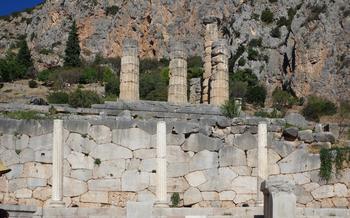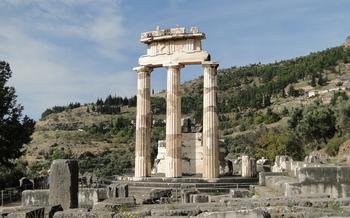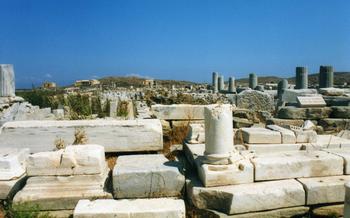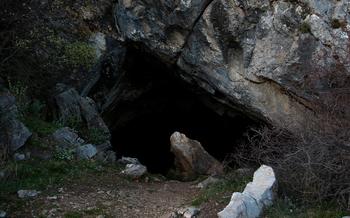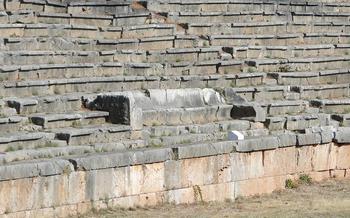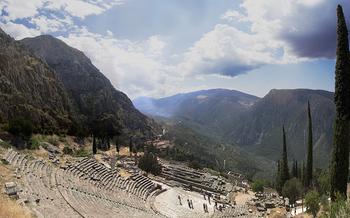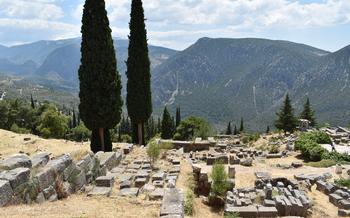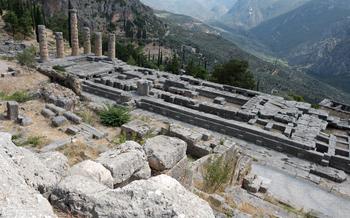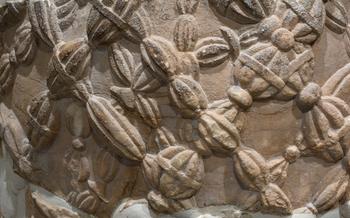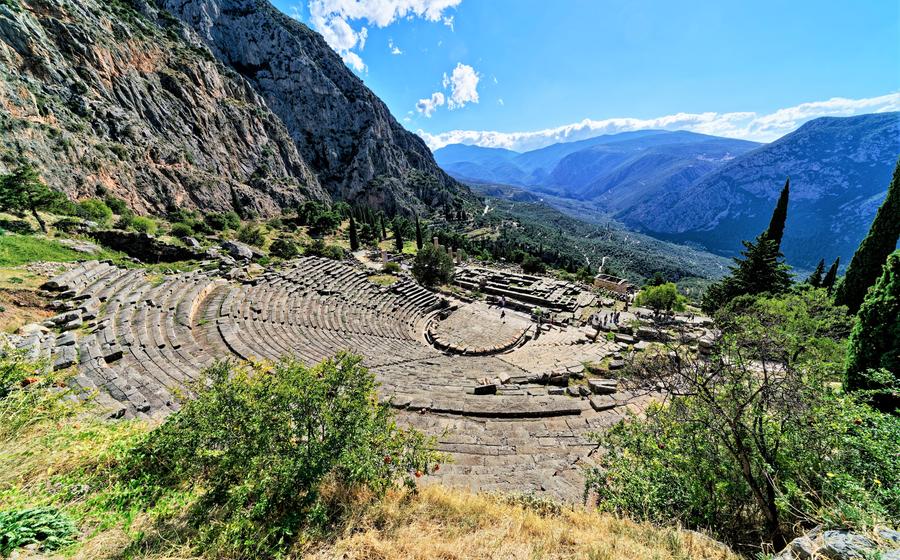
European Cultural Centre of Delphi
- Historical Significance
- Archaeological Sites
- Delphi Museum: A Treasure Trove of Ancient Artifacts
- Delphi Archaeological Park
- Oracle Consultations
- Panhellenic Games
- Getting to Delphi
- Accommodation and Dining
- Planning Your Visit
- Cultural Events and Festivals
- Local Customs and Traditions
- Sustainable Tourism
- Insider Tip: A Hidden Sanctuary in the Heart of Delphi
Historical Significance
Delphi, nestled in the picturesque valley of Phocis, Greece, holds an esteemed position in the annals of ancient history. Once considered the center of the world by the ancient Greeks, Delphi served as a sacred religious sanctuary and a prominent political hub. The city's reputation was deeply intertwined with the Oracle of Delphi, a revered figure who delivered prophecies and divine guidance to pilgrims and statesmen alike.
The oracle's influence extended far beyond Delphi's borders, shaping the course of Greek history. Kings, generals, and ordinary citizens alike sought the oracle's counsel on matters of war, peace, and personal dilemmas. The oracle's enigmatic pronouncements, often delivered in cryptic verse, played a pivotal role in shaping the destiny of ancient Greece.
In the 5th century BC, Delphi's significance reached new heights as it became a battleground in the Persian Wars. The city's strategic location made it a prime target for the Persian army, which sought to conquer Greece. The Battle of Delphi, fought in 480 BC, resulted in a decisive victory for the Greeks, marking a turning point in the conflict.
Delphi's influence continued to grow in the subsequent centuries, becoming a symbol of Greek unity and cultural achievement. The city hosted the Pythian Games, one of the four Panhellenic Games, which brought together athletes, artists, and spectators from across the Greek world. These games celebrated Apollo and showcased the cultural prowess of ancient Greece.
Archaeological Sites
Delphi's archaeological site is a testament to its rich history and significance. As you wander through the ruins, you'll encounter various structures that offer a glimpse into the city's past. The most prominent of these is the Temple of Apollo, an awe-inspiring Doric temple that once housed the oracle's sanctuary. Admire its well-preserved columns and intricate carvings, which depict scenes from Greek mythology.
The Treasury of the Athenians stands as a reminder of the city's wealth and power. This small building, constructed in the 5th century BC, was used to store offerings made by the Athenians to the oracle. Its intricate friezes showcase the legendary battle of the gods and giants, offering a glimpse into ancient Greek beliefs.
Another notable structure is the Stoa of the Athenians, a long colonnaded walkway that once served as a gathering place for pilgrims and visitors. As you stroll along its length, imagine the lively conversations and debates that took place here centuries ago.
Delphi's archaeological site is not merely a collection of ruins; it's a living testament to the city's enduring legacy. As you explore these ancient structures, you'll gain a deeper understanding of the religious, political, and cultural significance that Delphi held in the ancient Greek world.
Delphi Museum: A Treasure Trove of Ancient Artifacts
Delphi Museum, located at the foot of Mount Parnassus, is a treasure trove of ancient artifacts that provide a glimpse into the rich history and culture of Delphi. The museum houses a vast collection of sculptures, pottery, inscriptions, and other artifacts excavated from the archaeological site. Among the highlights of the collection are the bronze statue of the Charioteer, the Sphinx of Naxos, and the frieze of the Siphnian Treasury.
The bronze statue of the Charioteer, dating back to the 5th century BC, is a masterpiece of ancient Greek sculpture. The life-size statue depicts a charioteer standing in a chariot, with intricate details and remarkable craftsmanship. It was discovered in the Sanctuary of Apollo and is considered one of the most important works of art from the classical period.
Another notable artifact is the Sphinx of Naxos, a marble statue from the 6th century BC. The sphinx, with its human head and lion's body, is a symbol of strength and wisdom. It was originally part of a larger monument dedicated to Apollo and is a testament to the artistic achievements of the Naxian sculptors.
The frieze of the Siphnian Treasury, dating from the 6th century BC, is a series of marble panels that depict scenes from the Trojan War and the adventures of Hercules. The panels showcase the artistic talents of the Siphnian craftsmen and provide valuable insights into the mythology and storytelling of ancient Greece.
The Delphi Museum also features educational programs, temporary exhibitions, and interactive displays that enhance the visitor experience. Guided tours are available to provide in-depth explanations of the artifacts and their historical significance. The museum's collection offers a captivating journey through the cultural heritage of Delphi, making it a must-visit for anyone interested in ancient Greek history and art.
Delphi Archaeological Park
Amidst the awe-inspiring natural beauty of Mount Parnassus, the Delphi Archaeological Park encapsulates the essence of this sacred ancient site. Stroll along the well-marked walking trails that wind through the park, leading you to discover the ruins of ancient temples, treasuries, and monuments that have stood the test of time.
As you explore the park, let the breathtaking scenic viewpoints capture your imagination. Gaze upon the majestic peaks of Mount Parnassus, a source of inspiration for ancient Greek poets and philosophers. Allow the tranquility of the natural surroundings to transport you back in time, as you imagine the bustling city of Delphi during its heyday.
The park's visitor center serves as a treasure trove of information, providing insights into the history and significance of the archaeological site. Take advantage of the amenities offered, including restrooms, a cafeteria, and a gift shop where you can purchase souvenirs and mementos of your visit.
Explore the park at your own pace, allowing ample time to absorb the grandeur and history that surrounds you. The Delphi Archaeological Park is a testament to the enduring legacy of ancient Greece, offering visitors a glimpse into the spiritual and cultural heart of the Hellenic world.
Oracle Consultations
In ancient times, Delphi was renowned for its oracle, which served as a source of guidance and prophecies for people from all over the Greek world. Consulting the oracle was a sacred ritual that involved seeking advice and predictions on various matters, including personal decisions, political strategies, and military campaigns.
The process of consulting the oracle was intricate and awe-inspiring. Visitors would first make offerings and sacrifices to Apollo, the god associated with the oracle, and then approach the temple of Apollo, where the Pythia, a priestess chosen for her spiritual powers, resided. The Pythia would enter a trance-like state, believed to be induced by vapors rising from the earth, and deliver cryptic utterances that were interpreted by the priests.
These prophecies were highly valued and often influenced significant historical events. Kings, statesmen, and ordinary citizens alike sought guidance from the oracle before making important decisions. The oracle's responses, though often ambiguous and open to interpretation, were believed to hold great power and were treated with utmost respect and seriousness.
While the practice of consulting the oracle has long ceased, the legacy of the Delphic oracle remains a testament to the profound influence of religion and spirituality in ancient Greek society. Visitors to Delphi can still experience the awe and mystery of this ancient ritual by exploring the ruins of the temple of Apollo and learning about the history and significance of the oracle.
Panhellenic Games
The ancient city of Delphi was not only a religious center but also a host to the prestigious Panhellenic Games, held in honor of the god Apollo. These games were one of the four major Panhellenic festivals, along with the Olympic, Nemean, and Isthmian Games. The Pythian Games, as they were called, were held every four years and attracted athletes, artists, and spectators from all over the Greek world.
The games were a celebration of athleticism, artistic talent, and the unity of the Greek city-states. They featured a variety of competitions, including footraces, wrestling, boxing, chariot racing, and musical and poetic contests. The victors were crowned with laurel wreaths and given the title of "stephanites," which brought great honor and prestige to their home city.
The Pythian Games played a crucial role in promoting unity and friendly competition among the Greek city-states. During the games, conflicts and hostilities were set aside, and the focus was on celebrating shared cultural and religious traditions. The games also provided a platform for cultural exchange and the dissemination of new ideas and artistic styles.
The legacy of the Pythian Games lives on today in the modern Olympic Games, which were inspired by the ancient Greek tradition of athletic competitions. The Olympic flame is still lit in Olympia, Greece, before each Olympic Games, and the laurel wreath remains a symbol of victory and achievement.
Getting to Delphi
Delphi, a treasure trove of ancient wonders, is easily accessible from major cities in Greece. For those seeking a scenic journey, embarking on a road trip is highly recommended. From Athens, the capital of Greece, it's a picturesque 3-hour drive along the winding roads that lead to Delphi. Along the way, travelers are treated to stunning views of the Gulf of Corinth and the majestic mountains that embrace the region. Rental cars are readily available in Athens, offering the freedom to explore Delphi at your own pace.
For those preferring public transportation, buses and trains offer convenient options. Buses depart regularly from Athens' central bus station and take approximately 4 hours to reach Delphi. Train enthusiasts can take the scenic rail route from Athens to Lilaia, followed by a short bus ride to Delphi. This option offers breathtaking views of the countryside as the train meanders through picturesque landscapes. The journey takes about 5 hours, providing ample time to soak in the beauty of the region.
Regardless of the chosen mode of transport, the journey to Delphi is an experience in itself, offering a glimpse into the diverse landscapes and rich history that Greece holds.
Accommodation and Dining
Delphi offers a range of accommodation options to suit every budget and travel style. From budget-friendly hostels to luxurious hotels, visitors can find a comfortable place to stay in the heart of this ancient city. For a truly immersive experience, consider staying at a traditional Greek guesthouse, where you can enjoy warm hospitality and authentic local cuisine.
Indulge in the delectable flavors of Greek cuisine at Delphi's charming restaurants. Sample traditional dishes like moussaka, pastitsio, and souvlaki, prepared with fresh, local ingredients. Don't miss the opportunity to savor the region's renowned feta cheese, olives, and honey. For a taste of the sea, try the freshly caught fish and seafood, grilled to perfection and seasoned with aromatic herbs.
As the sun sets, Delphi's nightlife comes alive. Enjoy a leisurely stroll along the picturesque streets, where you can find a variety of bars and tavernas offering live music, traditional dancing, and delicious meze platters. Whether you prefer a quiet evening sipping local wine or a lively night out dancing until dawn, Delphi has something to offer every visitor.
Planning Your Visit
Planning a successful visit to Delphi requires careful consideration of the best time to visit, weather conditions, and recommended itineraries. The best time to visit Delphi is during the shoulder seasons, spring (April-May) and autumn (September-October), when the weather is generally mild and pleasant for outdoor exploration. Summer months can be hot and crowded, while winter weather can be unpredictable, with occasional snowfall.
When planning your itinerary, allocate sufficient time to explore the archaeological site, visit the museum, and take advantage of the natural beauty of the surrounding area. A full day is recommended to fully appreciate the site's significance and history. Guided tours are available and offer a deeper understanding of the site's features and history. Comfortable footwear and sun protection are essential for exploring the archaeological site.
Cultural Events and Festivals
Delphi is not just a historical and archaeological treasure trove; it also boasts a vibrant cultural scene that brings the town to life throughout the year. One of the highlights is the Delphi Festival, held annually in July and August. This prestigious festival showcases a diverse range of performances, including ancient Greek dramas, concerts, dance recitals, and art exhibitions. The festival provides a unique opportunity to experience the rich cultural heritage of Greece in an enchanting setting.
Other notable events include the European Cultural Centre of Delphi's ongoing programs and workshops. These events focus on promoting cultural exchange and dialogue, bringing together artists, scholars, and enthusiasts from around the world to explore various aspects of Greek culture and history.
For those seeking a more immersive experience, the Delphi Oracle Experience offers a glimpse into the ancient practice of consulting the Oracle. Visitors can participate in a reenactment of the oracle's consultations, receiving personalized prophecies and insights inspired by the ancient traditions.
These cultural events and festivals not only celebrate Delphi's rich heritage but also contribute to its ongoing cultural vitality, making it a vibrant and dynamic destination for visitors from around the world.
Local Customs and Traditions
When visiting Delphi, it's essential to be mindful of local customs and traditions to ensure a respectful and enjoyable experience. The town is steeped in Greek Orthodox beliefs, and visitors should dress modestly and avoid revealing clothing when visiting churches or religious sites. It's customary to greet locals with a warm handshake or a nod, and a smile goes a long way in fostering friendly interactions.
Respecting the local customs is not just about following rules but also about immersing oneself in the rich cultural heritage of Delphi. Attending a traditional Greek festival or learning a few basic Greek phrases can create meaningful connections with the locals and enhance the overall travel experience. Understanding the local way of life allows visitors to appreciate the unique charm and hospitality that Delphi offers.
Here are some additional tips for navigating cultural differences in Delphi:
- When entering a Greek Orthodox church, women should cover their heads with a scarf or shawl, and both men and women should dress respectfully.
- It is customary to remove shoes before entering someone's home.
- Tipping is not mandatory but is appreciated, especially in restaurants and for services like guided tours.
- If invited to a Greek home for dinner, it is polite to bring a small gift, such as a bottle of wine or a box of chocolates.
- Learning a few basic Greek phrases, such as "hello" (γεια σας, pronounced "yassas") and "thank you" (ευχαριστώ, pronounced "efharisto"), is a great way to show respect and connect with locals.
Sustainable Tourism
As a responsible traveler, it's essential to practice sustainable tourism when visiting Delphi. Minimize your environmental impact by opting for eco-friendly transportation options and choosing accommodation that prioritizes sustainability. Support local businesses and artisans by purchasing souvenirs and dining at traditional Greek restaurants. Respect the natural environment by avoiding littering and staying on designated trails. By embracing sustainable practices, you can contribute to the preservation of Delphi's unique cultural and natural heritage while ensuring a positive impact on the local community.
Insider Tip: A Hidden Sanctuary in the Heart of Delphi
Beyond the well-trodden paths of Delphi, nestled amidst fragrant olive groves and towering cypress trees, lies a hidden sanctuary that offers a moment of tranquility and awe-inspiring beauty. The Korykion Andron, an ancient cave dedicated to Pan, the Greek god of the wild, awaits those who seek a mystical connection with nature and the divine.
As you venture into the cave's cool embrace, you'll be greeted by a symphony of dripping water and the gentle rustling of leaves. The air is heavy with the scent of damp earth and the faint aroma of incense, transporting you to a realm where time stands still.
Within the cave's depths, you'll discover a natural amphitheater adorned with stalactites and stalagmites that resemble ancient sculptures. This sacred space once reverberated with the sacred hymns and rituals honoring Pan, the protector of shepherds and patron of music and dance.
As you sit in silence, surrounded by the echoes of antiquity, you may feel a profound connection to the spiritual essence of Delphi. Allow the serenity of the cave to wash away your worries and rejuvenate your spirit.
To reach the Korykion Andron, follow the path that leads from the village of Delphi towards the picturesque village of Chrisso. Just before reaching Chrisso, you'll find a signpost indicating the entrance to the cave. Embrace the opportunity to explore this hidden gem and create lasting memories in the heart of Delphi's sacred landscape.
